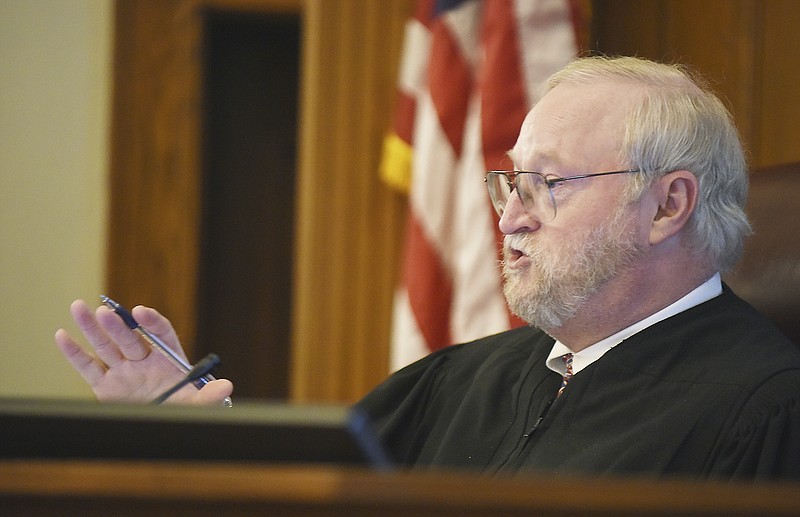Cole County Circuit Judge Jon Beetem should take in more evidence before ruling on a 2017 lawsuit challenging Missouri's new voter ID law, a three-judge state appeals court panel ruled Tuesday.
The Kansas City court's ruling sent the case back to Beetem, who had ruled Jan. 2 that the state was entitled to a judgment on the pleadings - meaning the plaintiffs had not submitted a case to take to a trial.
Tony Rothert, the ACLU of Missouri's legal director, said in a news release: "(The) decision is a win for Missouri voters. The court found that Missouri is dodging its legal responsibilities to voters in implementing this voter ID law."
Mary Compton, spokeswoman for Attorney General Josh Hawley, told the News Tribune: "We are reviewing the ruling and considering (our) next steps."
Secretary of State Jay Ashcroft said in a statement Tuesday afternoon: "This is just another attempt by the same organizations to throw out a state law passed by the general assembly and approved by 63 percent of Missouri voters in 2016.
"It's unfortunate that these same organizations continue to desperately challenge a law already held as constitutional, and continue to force taxpayers to spend state resources refuting these challenges."
Tuesday's ruling was on the first of two lawsuits filed in Cole County Circuit Court, challenging the voter ID law that went into effect June 1, 2017.
On June 8, 2017, the ACLU filed a lawsuit on behalf of the Missouri NAACP and the Missouri League of Women Voters, with a main argument that the state couldn't enforce the new law's requirement - for a voter to show a photo ID before getting a ballot at the polling place - because the General Assembly didn't appropriate enough money to pay the costs associated with implementing the new law.
The law went into effect after voters, in November 2016, added language to the Constitution allowing legislators to pass a law that could include requiring a photo ID at the polling place.
But the law also allows voters to show several other kinds of IDs - that have the voter's current address, but no photo - and still cast a regular ballot under certain conditions.
And it allows a voter with no ID to cast a "provisional" ballot - that won't be counted unless the voter shows a photo ID before the end of the election day, or the voter's signature on election day matches the signature on file in the election authority's office.
The law also says people who want a non-driver's license - which is issued by the state Revenue Department, and has the person's photograph on it - can get that license at no cost if it's to be used only for voting purposes.
The law says the state shall reimburse the agencies for all costs of getting the non-driver's license - including the costs of getting documents required to verify the person's identity - like a birth certificate or a divorce decree - and that the law's photo ID requirement "shall not be enforced if there is not a sufficient appropriation of state funds."
Among their claims, the ACLU argued, based on the appropriation of state funds, the secretary of state would be unable to pay for the cost of the documents necessary for individuals to obtain the state's non-driver's license.
The secretary of state's office countered that the lawsuit was filed too soon, because the "plaintiffs have failed to allege actual costs of implementation," and the appropriations question couldn't be argued until after the state's business year was finished.
In a 19-page ruling written by Judge Mark Pfeiffer, the court noted the law "makes the enforceability of the identification requirements contingent on 'a sufficient appropriation,' not on 'sufficient implementation' of the statute by the Secretary of State or other agencies."
And that means the issue raised in the lawsuit didn't have to wait for the state's "actual incurrence of costs to implement the statute, or the conclusion of the fiscal year to which the appropriations apply."
Jefferson City lawyer Rod Chapel, president of Missouri's NAACP, told the News Tribune: "When the NAACP brought this lawsuit, we hoped to demonstrate that voting is an important right and that it can be protected.
"Now on Nov. 6, people throughout the state of Missouri can go and vote, uninterrupted by the attempt to disenfranchise so many."
Tuesday's ruling didn't involve a second suit challenging the law, which was filed earlier this year, raised different issues and was tried by Senior Judge Richard Callahan.
That case raised constitutional issues, and both sides have appealed his Oct. 9 ruling to the state Supreme Court, but no date has been set for oral arguments.
Ashcroft said: "Opponents still haven't found a single individual unable to vote because of this law.
"It's time to stop wasting the courts' time and taxpayers' money coming back for bite after bite of the apple, with meritless claims attacking a law supported by the majority of Missouri voters and a supermajority of Missouri legislators."

